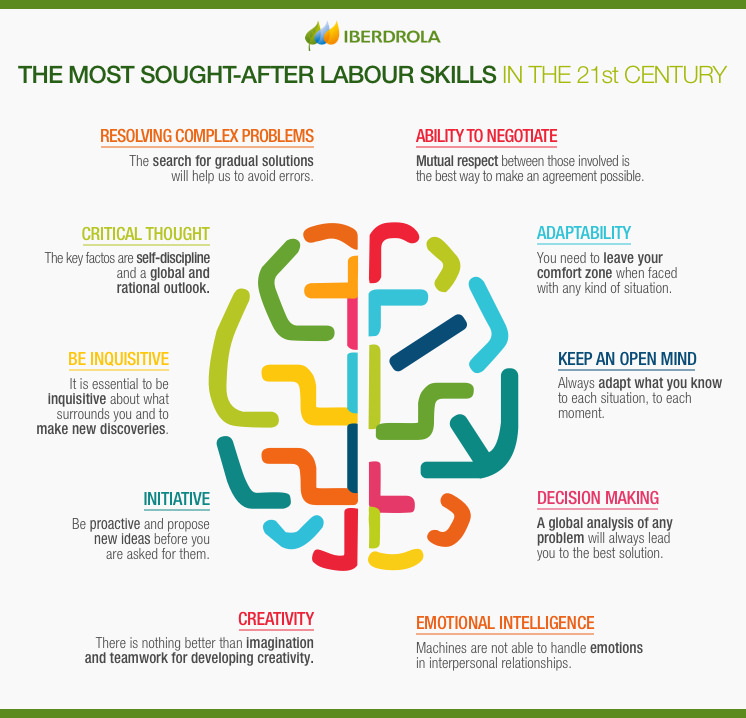Professions of the future
Which are the professions of the future?
Employment Business Human resources
The Fourth Industrial Revolution is already having a profound impact on the labour market. Some professions will disappear while others will blossom and require new abilities and skills. Let's see what they are!

An expert in Artificial Intelligence (AI), a brilliant master of Machine Learning (ML) and a Robotics Engineer are having a friendly chat after a day at work in one of the smart factories on the outskirts of the city. They are joined by several other young engineers who are experts in nanotechnology, 3D printing and genetics. In the conversation many topics will be frequently mentioned, things like strong algorithms, software design, cloud services, DNA, prototypes, big data and the Internet of Things (IoT).
These are the professionals of the Fourth Industrial Revolution, natives with digital skills who are playing the lead roles in the transformation of production systems and business models. They work in a coordinated fashion in an environment which is a fusion between industry and the Internet in sectors such as energy, smart homes, motor vehicles, aeronautics and pharmaceuticals. And this multidisciplinary coordination greatly increases the effect on efficiency, flexibility and productivity.
But it is not simply a question of technical skills. The most sought-after abilities and skills in the 21st century will be qualities which are typically human like solving complex problems, critical thinking and emotional intelligence, to name just a few. In this sense, knowmads stand out, workers appreciated for their flexibility, creativity and collaborative spirit.
The most sought-after labour skills in the 21st century


The keys of employability
The World Economic Forum in Davos concluded in its report on The Future of Jobs (2023) that 6 out of 10 employees will need to be trained in the next five years, while 44% of their skills may be affected by new jobs.
This means that the new labour market will entail the loss of routine jobs which can be mechanised. In the same way, there will be an increased demand for those working in information technology, communication and entertainment media as well as professional services. The key to employment in the future is not so much the appearance of new jobs but rather developments to a large number of those already existing.
The workers of the future
- White hat: this is the name for someone fighting against cyberpiracy. Doing what? Hacking for ethical reasons, like testing the security of your own system for example. They become experts in penetration testing and the assessment of vulnerability.
- Growth hackers: they are responsible for the growth of the company in new channels or markets and the perfect profile is a blend of programming, engineering, marketing and online positioning. They collect and analyse data and then draw conclusions so as to implement creative strategies which position a product or service before that of competitors.
- AI experts: the use of algorithms and guided learning enables data to be processed so you can learn from them and be able to make a forecast or suggestion.
- Experts in the IoT: the Internet of Things is taking giant steps forwards and together with AI will provide new opportunities for growth and development. It is most often used for monitoring energy and the use of materials using intelligent technology, security management and the automation of business processes.
- Intelligent transport developers: there will be engineers specialising in light vehicles made with carbon nanotubes, an allotrope of carbon with unusual and valuable properties with technological applications. It is considered to be the first material known to humankind which, in theory, is capable of indefinitely supporting its own weight above our planet.
- Climate guardians: the green economy with global awareness will also promote the appearance of new professions, like that of product tracer, carbon footprint control services and the vertical farming of hydroponic crops in cities.
- Sustainability analyst: The green economy requires sustainability, so a specialist is needed who is able to ensure that the company's development is based on criteria for a better ecological future.
- Human Resources specialist: In a world where employees no longer stay in the same company all the time, human resources are indispensable for retaining human talent and generating a good working environment to achieve objectives and adapt to changing times.
If you think there is still time for professional recycling, then your best bet is technology. The Fourth Industrial Revolution is here to stay...





